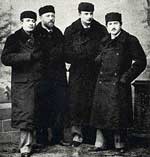

 |
 |
|
| String Quartets - a 2nd Golden Age The many links are integral to this report ! 
Flonzaley, Budapest, Lener, Busch etc - those were amongst the famous names of the first Golden Age of chamber music recordings [photo, Bohemian Quartet, Josf Suk R]. In UK, that heritage was furthered by later groups such as the Griller, Amadeus and Lindsays. But our 21st C boasts another new Golden Age of the string quartet, one with many facets, partly driven by commercil imperatives. Standards of technical accomplishment - and presumably of training - are higher than ever before, for recording technology as well as for playing. Specialism is extending the repertoire exponentially month by month and helping groups to achieve individual profiles. A few recent recommendable examples received: Early string quartets; historically aware (H.I.P.) training is now ubiquitous for strings students, and some choose to devote themselves to that area; history is needing to be re-written, and digital recording is playing its part: Eyblers & Cambinis: these two excellent young groups have opted to explore lost quartets from the early phase in which the string quartet flourished. The Eyblers have recorded music by their eponymous composer Joseph Leopold Eybler and by Johann Georg Heinrich Backofen; recommended. The Quatuor Cambini's new disc of quartets by the short-lived Hyacinthe Jardin [Timpani 1C1170] is released with a fascinating commentary, which deserves to be obligatory reading for string players. It argues that because chamber music playing was mainly restricted to domestic evenings, and remained "exclusively in the private sphere" [Jean Mongredien]. Information about prolific and successful composers of the times, such as Cambini and Jardin (1776-1800) has vanished almost without trace, skewing received opinion about the rich musical life of that period. It should inspire students seeking repertoire of their own to search and search, and that too an important task for their college and academy departments. In parallel with the early music movement, CD recordings are bringing to our notice international contemporary composers of whom we might otherwise remain unaware in our insularity. [Even when touring, concert promoters may Excitingly new to us recently have been Kreutzer Quartet discs of our own David Matthews. The Kreutzers have newly released the 9th Quartet of the far-out American individualist, mistress of the glissando Gloria Coates [Naxos American Classics 8.559666]. Also from Germany, this month we have been stunned by first acquaintance with the music of the Silesian-born composer Georg Katzer (b.1935), whose life has taken In the mainstream repertoire, younger quartets are challenging their predecessors. Of those newly received, the Pavel Haas Quartet has brought out a recording of Dvorak quartets which has a compelling intensity and epxressiveness [Supraphon SU 40382]. I thought they were possibly trying to beat the opposition with heightened dynamic range but, following Op. 96 with my score - ("Nigger quartet"! - Lengnick/Augener 1942, 1/9d - bought for my Bohemian Quartet 78s, recorded in 1920s; pictured R) - I was pleased to find that all the supposed exaggerations were exactly and meticulously prescribed by Dvorak hmself. Peter Grahame Woolf
|